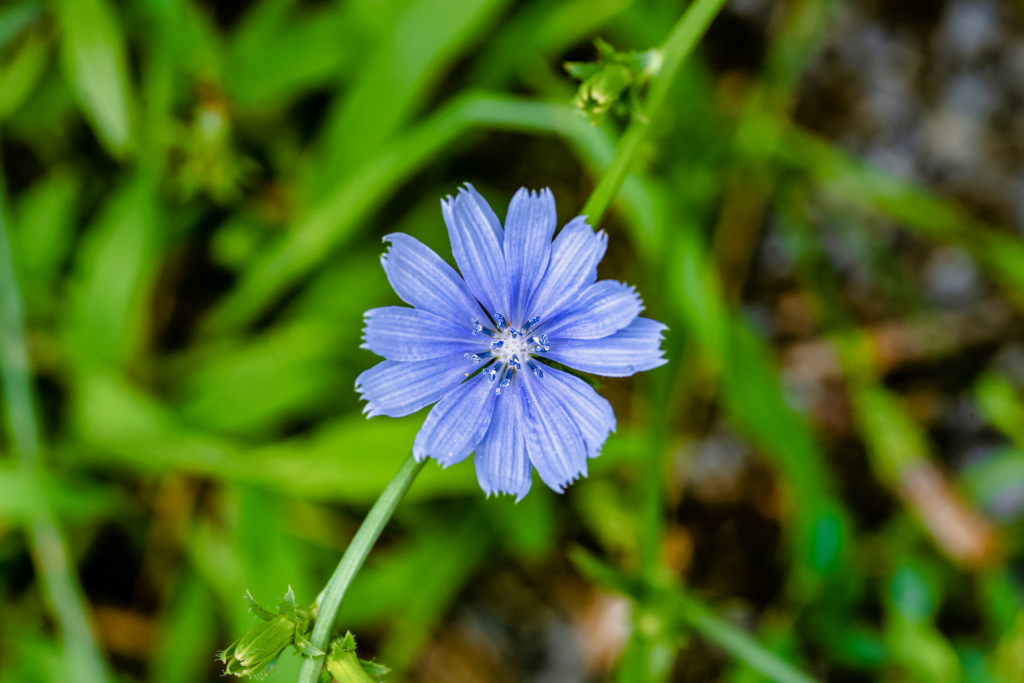In the world of coffee aficionados, beans reign supreme as they should. But when you start diving down the coffee rabbit hole, you learn about various substitutes and mixtures that people have historically brewed. Chicory being a huge one that’s often looked down upon due to its traditional use in times of shortages.
However, this ground and roasted root ended up a rather good companion to coffee. So much so that it’s become a signature flavor for our friends in New Orleans.
What is chicory coffee?

Chicory, known by the science nerds as Cichorium intybus, originally comes from Europe, where it’s been cultivated for centuries. Its leaves are used in salads, while its roots are roasted, ground, and brewed as a coffee substitute or additive.
For our interests here, only the roasted root part matters so keep in mind that’s what we’re referring to when we talk about chicory.
The roots have historically been used as a coffee substitute because they have an earthy taste and color close to but not quite like coffee. It’s also caffeine-free which makes it a popular alternative for those looking to cut down on their caffeine intake. Weird to replace coffee with something caffeine-free but such is life.
It can be brewed and enjoyed on its own or mixed with coffee to complement its flavor. In fact, chicory coffee has a long history of use as a coffee substitute, dating back to the 1800s in France during a coffee shortage.
Mixing chicory with coffee

During periods of coffee shortages or economic hardship, chicory has been used as an alternative to coffee because the earthy, slightly bitter flavors are reminiscent of coffee yet the chicory plants grow in ample supply. When coffee was available, it would be mixed with the roots. When it wasn’t, roasted chicory would be had on its own.
Even today, when coffee is plentiful and cheap, chicory has become a complementary ingredient, particularly in regions like New Orleans, Louisiana. The distinctive New Orleans-style coffee, is a signature blend that dates back to the 19th century when the roasted roots were used as a cost-effective extender and flavor enhancer during supply shortages. Chicory not only adds a unique, earthy taste but also helps to create a smoother, less acidic (bitter) cup of coffee.
Health benefits of chicory
In recent years, chicory has experienced a resurgence in popularity thanks to people’s obsession with natural remedies. With its unique flavor profile and health benefits, chicory has found its way into specialty coffee shops and health-conscious households.
Beyond the caffeine-free part, chicory boasts several health benefits. It’s rich in inulin, good for gut health, helps with satiety, and has anti-inflammatory properties (references here). Not bad for a strange-tasting decaf.
Closing thoughts
Chicory may have started as a coffee substitute, but its signature flavor has cemented its place in the coffee industry because its flavor stands on its own. Thanks to that, decaf won’t be getting rid of it anytime soon. So, the next time you’re exploring your supermarket’s coffee aisle, give it a chance. You might just fall in love with the taste.
Though please don’t. Not until we have a chicory blend to sell you anyway 😉
On that note, if you’d like a taste of chicory in coffee, Café du Monde has an iconic brew which you can buy at many supermarkets. It also makes a great Vietnamese coffee.
FAQ
Why do they put chicory in coffee?
The reason roasters put chicory roots in coffee varies by the time period. Traditionally, it had to do with stretching the supply of coffee or as a substitute during harsh times but in current times, chicory is added to coffee as a flavor enhancer.
Who should not drink chicory?
If you’re pregnant, breastfeeding, allergic to ragweed or have a history of kidney stones, you’ll wanna avoid drinking roasted chicory tea or mixing chicory with your coffee.
Please consult the list of side effects and precautions here for more detailed information.
What does chicory do to your body?
Chicory tea or coffee has several benefits, mainly, being a caffeine-free or low-caffeine alternative for those looking to cut down on it.
It also has a positive impact on digestion and gut health due to its inulin content, a prebiotic fiber that promotes the growth of beneficial gut bacteria. As for less direct benefits, chicory coffee has been linked to potential improvements in blood sugar control, reduced stress and a whole host of other benefits relating to inflammation and cholesterol levels.
Detailed information can be found here.
What does chicory taste like?
Chicory has a bitter taste with earthy and nutty notes. One of our team members swears there’s a hint of licorice. It’s a lighter tasting drink than coffee when brewed on its own but a great addition to coffee.
Where to buy ground chicory?
You can find quality chicory at Acro Coffee in Minnesota. They ship around the world.
Why did the French have a coffee shortage in the 19th century?
The French, and by extension, Canada and parts of Louisiana had a shortage due to the Continental Blockade implemented by Napoleon Bonaparte in 1806, which aimed to prevent the trade of British goods with France. This led to a tanking of coffee imports, causing the French to turn to chicory as a coffee substitute and later a flavor enhancer.
